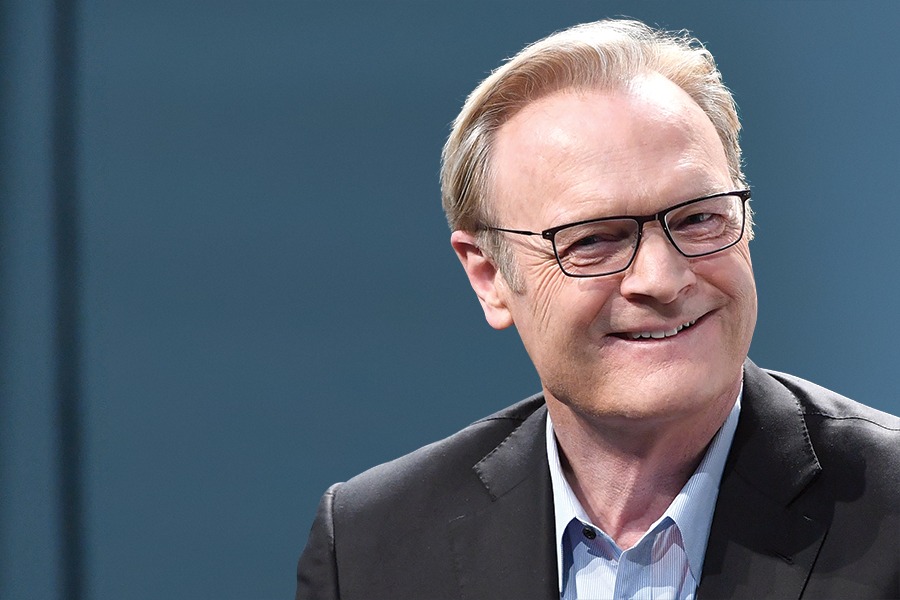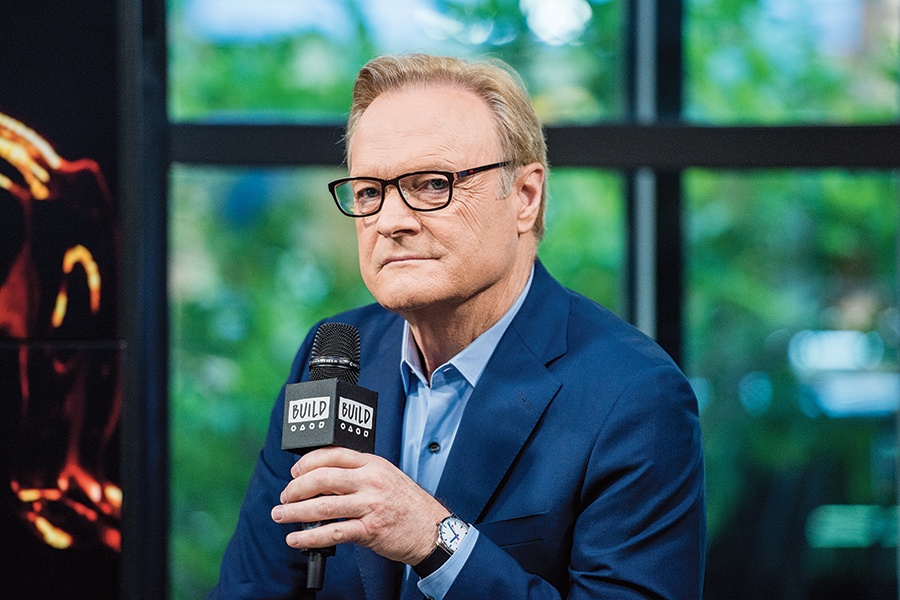The Interview: MSNBC’s Lawrence O’Donnell
Whether the topic is Hollywood, presidential politics, or cable news, MSNBC’s Lawrence O’Donnell has plenty to say.

Photo by Michael S. Schwartz/Getty Images
Is it any surprise that one of cable news’s most progressive prime-time stars calls Boston his hometown? After a career that’s included stints in Washington and Hollywood, Lawrence O’Donnell is celebrating 10 years behind the desk at MSNBC, where he hosts his very own cable news and opinion program, The Last Word with Lawrence O’Donnell. As the 2020 election season heads into the final innings, we caught up with the witty Harvard grad and Lampoon alum to get the scoop on working with Aaron Sorkin on The West Wing, the future of the Republican party, and why a Biden win would make cable news way more boring.
Are you the type of person who likes to have the last word?
No, I’m not. Socially, I spend much more time listening because I’m pretty bored with what I think and what I have to say. And you don’t learn anything while you’re talking, only while you’re listening. And by the way, that includes listening to people who I think are wildly wrong and uninformed.
After 10 years of doing the show, are you tired of the job?
I started tired. I thought I was going to do this for maybe a year and a half. My first contract was for three years, and I just thought, Well, that’s ridiculous. I’ve never signed up to do something for three years. All of my previous contracts in show business and elsewhere were generally for a year at a time. To hear you say 10 years is a bit of a shock. I’m going to have to process that.
What is the first thing you like to do when you come back to Boston?
In the normal universe, the first thing I do when I come back to Boston is get in my brother Michael’s car at the airport, and we drive straight to his boat.
Would you say your days with the Harvard Lampoon inform your on-air persona? And is it a persona or is it really you?
Oh, Jonathan, how dare you ask the most profound possible question of an anchorman: Is it a persona, or is it you? There’s a tremendous complexity to that, because everything that happens on television is in a frame that’s much tighter than reality, and it can’t possibly convey the full person who you’re looking at. There are so many layers to us, and what TV does is it grabs one layer of you and it very deliberately leaves out 99 other layers that can never fit inside the frame.
Do you ever get nervous before a broadcast?
Yes, when I care desperately about a particular component of the show. The most recent example would be presenting Isabel Wilkerson and her book Caste, which is possibly the most important book of this year, and many other years. The task of being fair to that, and giving the audience the right sense of that, is so daunting to me that it makes me very nervous, but very few other things do.
You’ve worked in Hollywood entertainment, New York news, and Washington politics. Which is the most dysfunctional?
Well, right now, the most dysfunctional is the United States Senate, by far. It is very sad for people, like me, who worked there [as a senior adviser to Daniel Patrick Moynihan and chief of staff of the Senate Finance Committee], because my job no longer exists. The office is there, someone has the business card, but no one does the work. They don’t legislate anymore. And that’s what we did. That makes it impossible to miss, too. You can miss your high school, but generally the school is still there, and the people are still doing something vaguely familiar to what you did. But this is literally like someone came along and burned down your high school and it no longer exists.
Most exciting moment when you worked in Washington?
It was always something that happened on the Senate floor at 2 o’clock in the morning, when we were finally getting the crucially important bill passed. The excitement level of that is not something I could duplicate anywhere else, and the importance of that can’t be duplicated anywhere else.
Was working with the famous screenwriter Aaron Sorkin on The West Wing intimidating?
Not in the least. It was fantastic, and it taught us all so much about what was possible in TV writing that none of us knew was possible before Aaron did it. And oh, by the way, this is the most important thing: Aaron didn’t know it was possible. He was writing within a 60-minute frame that was defying every single previous existing convention about television drama. And we didn’t know until it got on the air, and the audience responded, that it was going to work. And so all of television, and all of screenwriting, learned a tremendous amount from what he was able to create in those 60 minutes on Wednesday nights.
What would you say if you found yourself stuck in an elevator with your counterpart at Fox News, Laura Ingraham?
I’d say, “Hi, Laura, how are you? How are the kids?” I’ve known her since 1996. The last time I ran into her was in an airport, many years ago, maybe even before I had this show, and it was as cordial as it ever was. I’m sure that’s exactly what it would be if I ran into her now.
You’ve called yourself “a practical European socialist.” Why do you think socialism is such a dirty word in this country these days?
Well, it’s only half as dirty as it was when I first used it, in the 1990s, to describe my own views. People like Bernie Sanders and Alexandria Ocasio-Cortez have been very busy educating America about just how much socialism we have, from Social Security to Medicare to public schools to public universities, and how much we love that. The truth is that there is no pure socialist or capitalist economy on earth. If you’re in China, you could describe yourself as a capitalist. An American can choose to describe themselves as a socialist. Since the socialist part of our lives, which is a minimum of about 40 percent of the American economy, is so underrated, I decided to use that as a description for me.

Photo by Roy Rochlin/Getty Images
What one word would you use to describe Donald Trump’s attack on the free press?
Dangerous.
Does what’s happening with immigration under the current administration fly in the face of everything you believe?
The Trump view of immigration defies our history. Immigration is a transaction that has historically benefited the country. We’ve traced the immigrant population in the United States, and we have a couple hundred years of very accurate social science information that tells us that the people who leave one place where they’re unable to make it and go to another place are the most adventurous, ambitious, and energetic.
What scares you most about a Trump victory in 2020?
Nothing. Because I know it’s not going to happen.
What do you think is the future of the Republican Party? Does it have one?
As of today, there is no Republican Party. It has been disbanded and congealed into something called Trumpism. And when Trump loses in November, the next day, the people in Washington who have the word “Republican” on their label literally will not know who they are or what they think, because so many of them have reversed their positions on so many policies. The word Republican will continue to be there, because political parties are giant corporations and they’re not going to dissolve the Republican Corporation. But it’s very hard to say what will happen within that party.
Do you think the United States has become a second-rate country?
No. The United States is and will continue to be the most important country in the world, economically, militarily, intellectually. There’s nothing that four years of Trump can do to stop that. What it is no longer, during the Trump years, is the leading source for better governmental arrangements between countries. It has become the opposite.
The KIND Fund—Kids in Need of Desks—which you started with UNICEF, is really impressive. Why is it so crucially important for children to have a desk?
It creates a sense of purpose in the classroom that is so much stronger than a classroom where everyone’s forced to sit on the floor, which is a physically painful thing to do over the course of seven hours. Anyone who wonders about that should try it and see how they feel after 90 minutes.
What is your most trusted news source?
I don’t trust news sources, and neither should other people. They should use them in the same way that they use medical opinions and get more than one on the important issues. Trust is the most precious thing you could possibly give to another person. But to institutions? Publications? The best journalism that has ever existed is sports journalism, because it’s really true. The Red Sox really did score seven runs last night and the other team scored three, and every other fact that’s presented on the sports pages is an actual fact. Once you move off the sports pages, you’re into a much trickier zone.
How has the pandemic affected cable news?
It’s changed radically the way we actually get a show on TV. We’re doing it in ways that we didn’t know were possible. And we are all staring at it in amazement that it works. I think that having the guests at home is a gigantic improvement that we should retain in the post-COVID world.
Is that because they’re in their own space and they’re more comfortable and less guarded?
Yes, and it gives the audience so much more information. As someone who’s worked with the television frame in many different ways, I’ve always stared at the cable news frame and thought about how wasted so much of that space is. There’s nothing more fascinating than “What kind of coffee maker is that over his shoulder?” That is just so rich and it doesn’t detract from me hearing what he’s saying. It lets my eyes have something to do. Otherwise, it’s radio.
Who do you think is the most intellectually dishonest person in television news?
I don’t know, because I’d have to know that someone doesn’t believe what they’re saying. You can certainly point out wild inconsistencies over time for the Fox prime-time players, who’ve all held different positions, especially on matters like international trade, the budget deficit, and the national debt. They’ve abandoned all those positions. But they may have changed their minds for all I know.
Is there anyone who you think has tremendous integrity?
Rachel Maddow is just flawless in her adherence to integrity, in every single grain of what she does.
Would a Joe Biden win make the news more boring for you?
No, but I think it might make the news more boring for viewers, who would feel they don’t have to check in on how the world’s going to end tonight.
How about your biggest on-air faux pas?
Oh, I have so many it’s hard for me to rank the biggest.
What do you think when you see yourself on TV? What’s your reaction?
The fundamental thing that I wish when I see myself on TV is that I had written that stuff for a great actor. I wish it was the old days and I could have handed that script to Martin Sheen or to Allison Janney and just watch them do their magic. I hate handing my scripts to me, for me to do them.
What one thing that you learned at Harvard has informed your career the most?
The enormity of my ignorance.
By the Numbers
Lawrence O’Donnell isn’t the only local to make it big on the small screen. Here’s how some others stack up.
$20 million
Amount of money Everett native Ellen Pompeo makes each year for starring in Grey’s Anatomy.
4
Locals turned Hollywood actors (John Krasinski, Mindy Kaling, Steve Carell, and BJ Novak) who starred in The Office.
5.2 million
Number of viewers Rachel Maddow—who lives part-time in western Massachusetts—drew for an edition of her show earlier this year.
20
Number of times Burlington’s Amy Poehler has been nominated for an Emmy.
30
Number of seasons Swampscott native Lesley Stahl has been on the CBS news show 60 Minutes.
145
Number of Saturday Night Live episodes in which Lexington’s Rachel Dratch appeared.
14
Number of episodes in which you can hear Rachel Dratch, playing Denise on the “Boston Teens” sketch, wield her wicked exaggerated Boston accent.


